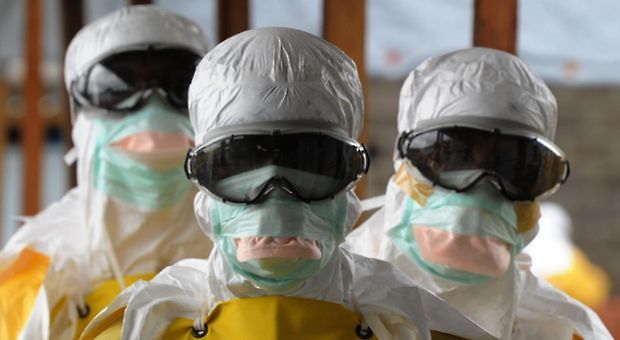
Time magazine has named “Ebola fighters” as its Person of the Year for their “tireless acts of courage and mercy.”
“Ebola is a war, and a warning,” Time editor Nancy Gibbs writes in announcing the magazine’s choice for most influential newsmaker of 2014. “The global health system is nowhere close to strong enough to keep us safe from infectious disease, and ‘us’ means everyone, not just those in faraway places where this is one threat among many that claim lives every day. The rest of the world can sleep at night because a group of men and women are willing to stand and fight.”
The Ebola outbreak struck West Africa this year, mainly in Guinea, Sierra Leone and Liberia before spreading to Nigeria, Senegal, and Mali. It has claimed more than 6,000 lives, according to the World Health Organization.
The United States was swept up in the outcry over Ebola when a Liberian national, Thomas Eric Duncan, became the first Ebola patient diagnosed with the disease on U.S. soil. Duncan, who contracted the disease in Liberia before traveling to the U.S., died in a Dallas hospital in October. Two nurses who treated him were infected, but both have since recovered.
The Time cover story takes an close-up look at people on the front lines of the fight against Ebola, from Dr. Tom Frieden, director of the Centers for Disease Control, to ambulance supervisor Foday Gallah.

Dr. Frieden notes that there was initially friction with the World Health Organization when the CDC sent in a team to West Africa.
“Essentially, people thought it was going to be controlled, and they didn’t want us there. So I had to tell WHO, ‘Let our team in, this is ridiculous,’” Frieden says. “They wanted to do it themselves. There was resentment. They didn’t want to feel like they were dependent on the CDC. We left, and then Ebola came roaring back.”
Gallah, an ambulance driver, explaining his work, says, “I am going to get on that ambulance. I am going to every nook and cranny of the capital city, pick up whatsoever Ebola patient and take them to the treatment unit, and give them words of hope, of encouragement. And try to educate people about Ebola.”
Kent Brantly, a doctor who contracted the deadly virus while working in Liberia, said he went to Liberia because he felt it was his vocation to spend his career as a medical missionary. “Deep in the core of my heart, I still think that’s my calling,” he says. “I don’t want to go on with life and forget this.”
Kaci Hickox, a 33-year-old nurse from Maine who got caught up in the controversy about quarantining returning workers who may have been exposed to Ebola, said she witnessed in Sierra Leone the devastation that the disease causes “and have personally experienced the stigma that fear of this disease brings.”
“Still, I hope that compassion and knowledge will soon overcome the fear so that we can beat Ebola,” she tells Time. “I do want to go back to West Africa, but for now, I’m taking things day by day.”
Nurse Nina Pham was also infected with the virus while caring for a patient at a Dallas hospital. “I replay it over and over again in my head how I could have gotten infected,” Pham says. “I did everything that was recommended. It was just a shock when my chief nursing officer and a CDC officer came to see me in their full protective equipment. I knew it was not good.”
Time’s annual selection goes to a man, woman, couple or concept that the magazine’s editors feel had the most influence on the world during the previous 12 months.
In addition to Dr. Brantly and Gallah, the ambulance driver, Time highlighted on its cover three other Ebola fighters who worked on the ground in West Africa:
– Dr. Jerry Brown, a Liberian surgeon who converted his hospital’s chapel into one of the country’s first treatment centers.
– Salome Karwah, an Ebola survivor who lost both parents to the disease and undertook the task of counseling patients in Liberia.
– Ella Watson-Stryker, a Doctors Without Borders health promoter who has been in West Africa since March.
Runners-up for the Person of the Year selection were: The Ferguson, Mo., protesters, Russian President Vladimir Putin, Kurdish leader Massoud Barzani in Iraq, and Jack Ma, the Chinese entrepreneur who founded the company Alibaba.
The first Man of the Year was aviator Charles Lindbergh, who appeared on the cover of the magazine’s Jan. 2, 1928, issue. Past selections included Wallis Simpson, the duchess of Windsor, in 1937, Amazon founder Jeff Bezos in 1999, the personal computer in 1982, and “the American fighting-man” in 1950.
